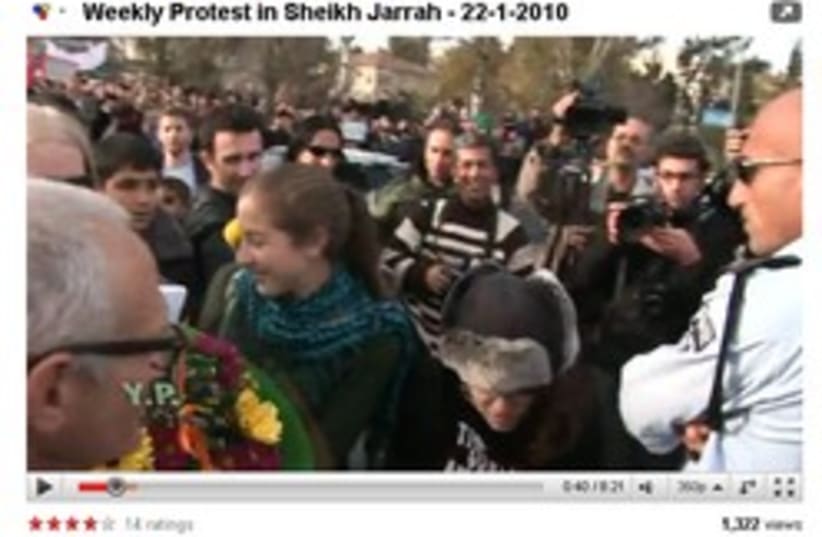Social media sites like Facebook, YouTube andTwitter, along with a slew of blogs, are playing an increasing role inthe growing participation of young Israelis in protest rallies in theeast Jerusalem neighborhood of Sheikh Jarrah, activists and journalistsfamiliar with the situation there told The Jerusalem Post on Monday.
Activistsand journalists both described a situation in which protesters wererelying on the Internet to try and affect change on the ground andraise awareness of the arrests made during demonstrations in theneighborhood.
"It's all Facebook, e-mails and Twitter," said Didi Remez, ahuman rights activist, who has become noticeably involved in the SheikhJarrah protests as of late. Remez was arrested during a protest therelast Friday.
Remez also said that distant audiences, like American Jews, whomight be deprived of Sheikh Jarrah coverage due to the mainstreammedia's lack of interest, were instead staying abreast of the situationvia social networking sites.
"The American media is for some reason refusing tocover this," he said. "Even though it's becoming a major issue inIsrael. And still, despite that, there's a lot of awareness [of thisissue] among Jewish Americans, the reason being that they areincreasingly connected through Facebook, Twitter, blogs and so on."
"They're getting information on this without The New York Times,"Remez continued. "So, something that hasn't been covered at all by the[American] mainstream media, is still getting coverage through newmedia, and I think that's a statement about the decline of themainstream media and maybe a larger comment on the shift away from it."
Othersechoed Remez's comments, but added that another advantage of socialmedia was its ability to counter police statements about Sheikh Jarrahthey said the mainstream media often parroted.
"This is an issue that the media hasn't really been covering,and when they have, they've mostly relied on police statements thatportrayed the protesters as a handful of extreme leftists oranarchists, which is simply not true," said Lisa Goldman, a Tel-Avivbased freelance journalist who has used Facebook, Twitter and blogs tofollow the Sheikh Jarrah protests.
"What the social media outlets have been able to provide is adirect source of information that isn't filtered through the mainstreammedia," she said, adding that in this vein, the use of new media hadbeen "absolutely crucial."
Additionally, Goldman added, social media outlets had alsoserved as a tool to awaken the mainstream Left to the goings-on inSheikh Jarrah, including, but not limited to, the emerging issue ofpolice behavior towards protesters there, which the JerusalemMagistrate Court has even censured - ruling last week that the arrestsof 17 protesters during a rally two weeks ago was illegal.
"The silent Israeli Left is finally waking up," she said. "Andit's a result of the way some young people are using social media. It'sbeen very effective in raising awareness among the moderate Left, whoare seeing that the police are suppressing free speech."
Goldman also pointed to the participation in last Friday'srally of Prof. Moshe Halbertal, who helped draft the IDF code of ethicsand who has been active in disputing the United Nation's GoldstoneReport, as an example of figures who would certainly not be consideredextreme, but who have joined the Sheikh Jarrah fray.
Hagai El-Ad, the director of the Association for Human Rightsin Israel and one of the 17 protesters arrested two weeks ago, addedthat the use of new media to circumvent the mainstream media, which, hesaid, was often "reluctant to cover hard issues, or blatantly hostile,"was spreading rapidly.
"However, it's not just new media [at play in Sheikh Jarrah],"he said. "I think there's a need to [step back] from the tactics beingused there, and zoom in on the core issue, which is the moral outrageof Jerusalemite families being thrown out of their homes and living intents in the street. That's the essential injustice here, and I thinkit's a fuel of its own."
Yet El-Ad did concede that the use of new media was a driving force behind the success of the Sheikh Jarrah protest organizers.
"They are a courageous group of young people, who arefunctioning without any real budget or resources," he said. "But theyare cleverly online, and they've been able to translate that into realmovement on the ground - it's not just a Facebook group that people addtheir names too."
"Yes, the mobilization happens online," El-Ad added, "but the end result is the most classic form of civil protest."
